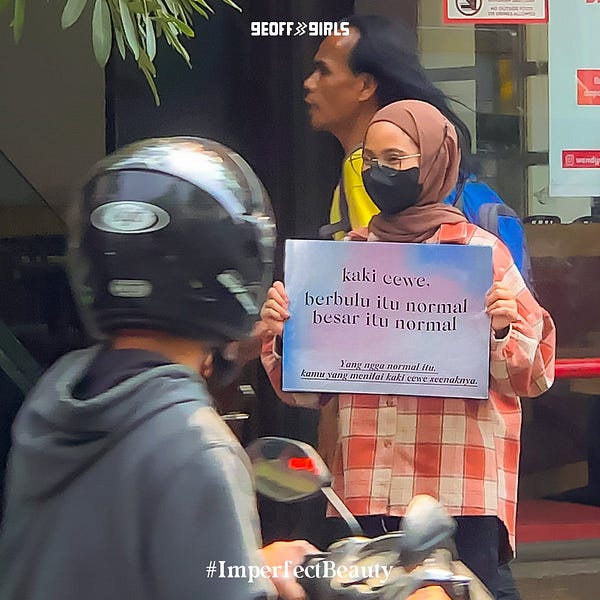You Can't Be Seen Until You Learn How To See
Business | Why marketers understand human nature and the urgency to do so
Hello Knowledge Junkies. Today, we’re going to have a case study about a brand, and its correlation with the ability of marketers to understand their customers better than most psychology students. Cause sometimes I feel like they are more similar to evolutionary scientists than storytellers.
Let’s start.
Feet obsession?
During my run this morning, I decided to take a break and open up Twitter to see if are there new interesting papers for me to check out. Instead, what I found is a brand called Geoff Girl and their campaign of “anti foot shaming”.
And as always if you want to know more about something, you see how people react to it. So I got to the comments and read some of them. First reaction: I start looking at my foot, and um… it seems pretty okay. Like before this advertisement, I never really think about it. Second reaction: it’s interesting to see some adverse reactions in the comments, and I ask myself “Why does this person have an adverse reaction towards an anonymous comment?”
You can analyze it from an individual level. For instance, you can argue that this person has a higher level of neuroticism that might mediate their reactions because they tend to be more self-conscious about themselves; their bodies, and their behaviors. At the same time, you can analyze it from a societal level. “What needs to happen for a society in which people need to be validated for their feet?”
The reason why I’m asking this question is that I don’t think these kinds of issues are presented in the tribe of people in Kalimantan or Amazon forest. I genuinely don’t think they’re sitting with their tribe member and saying to one another, “Damn, what’s up with my feet”. And so I wonder, “Hmmm. Why can’t I imagine those tribes would think those things?”
For starters, I could be wrong. As the saying goes in my country, “Lo mainnya kurang jauh Yeg.” It’s a term that usually tries to argue that people need to explore more about a certain phenomenon outside of their usual environment or comfort zone. So I am more than welcome to see evidence of a culture that cares about these sorts of things.
Secondly, if I turn out to be correct that most cultures don’t care about these sorts of issues, it’s probably because for those tribe members there are more important issues to care about, such as the health of their tribe members, the sustainability of the tribe itself, and whether or not, I’m contributing to the tribe. So perhaps, they still get insecure, just maybe not on trivial matters. Maybe they are more likely to get insecure if they don’t act in a way that benefits their tribe.
Thirdly, and this is my main argument, social media has an effect on people’s self-image that makes them more self-conscious in modern societies, hence they become more insecure about certain things that indigenous people don’t care about at all.
It changes us
I think deep down people underestimate how much social media changes our behavior. Most people think that we have adapted to it. Yet, I think it changes us fundamentally. For the better, and most certainly, for the worse. When the means of our communication makes us care more about our appearances than ever before in the history of human beings. Then, yeah I think it has unintended consequences.
And one of them is that it makes us care more about our self-image than ever before. It’s different when social comparison only happens between 150 people, but when it happens between you and all people from around the globe, it’s going to make you more aware of the things that you usually don’t really care about. And the thing with social comparison is that we’re mostly not aware when it’s happening to us. Now put that mechanism on steroids, and you’ll see how an entire generation can feel insecure about every single thing there is that can be insecure about.
No wonder people constantly need validation, both internally and externally.
What does this have to do with marketers?
Marketers have an in-built incentive to figure out what makes people tick. Because in the end, they got to sell a product/service that people need. And due to modernity providing people with all kinds of convenience, most of the things that we think we need most likely appeal to our emotional needs. Hence, the term “all marketers are liars tell stories” is relevant. Because people buy stories.
As Seth Godin points out, “You can’t be seen until you learn how to see.” Really see people for what they are. And if they see that modern condition makes people more insecure about their body parts, why not sell them something that will coddle them for the things that they are insecure about? When people felt that they are being seen, they will more likely to reciprocate and see your brand.
Yeg, does that mean they advantage of people’s insecurity? Maybe. Although, I’m more amazed at their capacity to just be real about human nature. It makes them more creative at solving problems that might seem technical at first. That’s why I’ve been enjoying learning from Rory Sutherland, Vice Chairman of Ogilvy in the UK.
What is an example of a problem that might seem technical at first glance? Here’s an excerpt from his book Alchemy.
“Imagine that you are sitting in the boardroom of a major global drinks company, charged with producing a new product that will rival the position of Coca-Cola as the world’s second most popular cold non-alcoholic drink.*
What do you say? How would you respond? Well, the first thing I would say unless I were in a particularly mischievous mood, is something like this: ‘We need to produce a drink that tastes nicer than Coke, that costs less than Coke, and that comes in a really big bottle so people get great value for money.’ What I’m fairly sure nobody would say is this: ‘Hey, let’s try marketing a really expensive drink, that comes in a tiny can . . . and that tastes kind of disgusting.’ Yet that is exactly what one company did. And by doing so they launched a soft drinks brand that would indeed go on to be a worthy rival to Coca-Cola: that drink was Red Bull.”
I have respect for marketers because they learn to solve things psychologically. Because they understand their customer. And maybe if we want to help other people, we got to learn to see what lies “behind the curtains”.
Your Favorite Dealer,
@alephlove.





